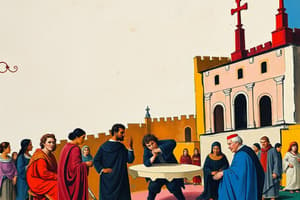Podcast
Questions and Answers
What prompted European nations in the 19th century to consider national civil codes?
What prompted European nations in the 19th century to consider national civil codes?
- The influence of Greek philosophy on legal structures.
- The rise of direct democracy in nation-states.
- The need for harmonization due to diverse cultures.
- A systematic structure reflecting the evolving idea of community and society. (correct)
What distinguishes ius gentium from ius civile?
What distinguishes ius gentium from ius civile?
- Ius gentium is specific to national statutes.
- Ius gentium applies only to foreigners.
- Ius civile is based on international agreements.
- Ius gentium is a law common to all human beings. (correct)
Which cultures form the foundational pillars of European culture, as mentioned in the content?
Which cultures form the foundational pillars of European culture, as mentioned in the content?
- Roman, English, and Jewish.
- Greek, Byzantine, and Christian.
- Greek, Roman, and Islamic.
- Greek, Roman, and Christianity. (correct)
Why is ius gentium not classified as private international law?
Why is ius gentium not classified as private international law?
What distinguishes modern democracy from ancient democracy in the context mentioned?
What distinguishes modern democracy from ancient democracy in the context mentioned?
What is the relationship between ius gentium and international commercial law?
What is the relationship between ius gentium and international commercial law?
Which of the following best describes the 'Democracy of Ancients' according to the content?
Which of the following best describes the 'Democracy of Ancients' according to the content?
Which two models are identified in relation to the democracy of the ancients and moderns?
Which two models are identified in relation to the democracy of the ancients and moderns?
Which statement about Justinian’s Digest is correct?
Which statement about Justinian’s Digest is correct?
According to the distinctions made in the content, what type of law refers to the common law of all mankind?
According to the distinctions made in the content, what type of law refers to the common law of all mankind?
What does Aristotle consider the best form of government?
What does Aristotle consider the best form of government?
What change occurred in the interpretation of democracy after Aristotle's time?
What change occurred in the interpretation of democracy after Aristotle's time?
According to the analysis of Polybius, why did the Roman Republic succeed in expanding its territory?
According to the analysis of Polybius, why did the Roman Republic succeed in expanding its territory?
How does Aristotle differentiate between good forms of government and their deviations?
How does Aristotle differentiate between good forms of government and their deviations?
What was the main focus of Polybius's work, 'The Historia'?
What was the main focus of Polybius's work, 'The Historia'?
Flashcards
Good Government
Good Government
A good form of government where the rulers govern in the best interest of all citizens, not just a select group.
Deviation from Good Government
Deviation from Good Government
A bad form of government where the rulers govern solely for their own interests, disregarding the needs of the majority.
Kingship/Reign
Kingship/Reign
A form of government ruled by a single person, usually a king or queen, with absolute power.
Aristocracy
Aristocracy
Signup and view all the flashcards
Politeia (Constitutional Government)
Politeia (Constitutional Government)
Signup and view all the flashcards
Ius Gentium
Ius Gentium
Signup and view all the flashcards
Ius Civile
Ius Civile
Signup and view all the flashcards
International law
International law
Signup and view all the flashcards
Corpus Iuris Civilis
Corpus Iuris Civilis
Signup and view all the flashcards
Digest
Digest
Signup and view all the flashcards
Dynamic Law
Dynamic Law
Signup and view all the flashcards
Universal Law
Universal Law
Signup and view all the flashcards
Harmonization of Law
Harmonization of Law
Signup and view all the flashcards
Democracy of Ancients
Democracy of Ancients
Signup and view all the flashcards
Democracy of Moderns
Democracy of Moderns
Signup and view all the flashcards
Study Notes
Harmonization of Law and Legal History (Roman Law)
- Harmonization of law is a more democratic method for creating a common law within a community.
- Rules are built from the bottom up, with each country working together to create a common rule.
- Unification is a less democratic approach; a central authority imposes a common rule.
- The European Commission frequently imposes rules, but countries have no say.
- Harmonization is more suited to a globalized world where countries continue to have separate legal systems.
- Unification is difficult to achieve; international law fails to establish widespread application.
- International law alone is insufficient in creating a unified legal system.
- Europe has not achieved complete legal unification due to national sovereignty and jurisdiction.
Ancient Models of Harmonization of Law
- Roman law (Ius Gentium): a supernational legal system of universal application.
- Ius Gentium is distinguished from public international law.
- Ius Gentium is also not private international law, which addresses conflicts between nations.
- Ius Gentium is distinct from ancient international commercial law (lex mercatoria).
- Ius Gentium contained a common body of law for Romans and foreigners.
- Justinian's Corpus Juris Civilis is a compilation of Roman legal works, acting as a source of classical Roman law.
Middle Age Common Law in Europe
- The fall of the Roman Empire led to the fragmentation of universal power, and distinct territories developed their own laws.
- The 12th century saw a revival of legal study, particularly in Bologna and Florence, with renewed interest in Justinian's codification.
- The concept of Ius Commune emerged in Europe unifying legal principles.
- During the Middle Ages, interpretations of existing law developed—Glosses, Commentaries, and Legal Humanism.
- Different interpretive traditions arose over time, moving beyond direct interpretation of Roman law to more nuanced analyses and wider application of Roman law.
Democracy of Moderns vs. Democracy of Ancients
- Modern democracy is indirect, with citizens electing representatives to govern.
- Ancient democracies, exemplified by the Greek polis, were direct, with citizens participating directly in decision-making.
- Modern societies, having larger populations, often face challenges implementing direct democracies.
- Different historical periods have different views on what constitutes ideal forms of government.
- Ancient forms, like those observed in ancient Greece, differ from modern concepts of government, even while impacting modern perceptions.
- Ancient (direct) democracies, unlike modern forms, allowed citizens to directly participate in governance and judgment.
Polybius and the Roman Constitution
- Polybius analyzed the Roman constitution as a mixed constitution—combining elements of monarchy, aristocracy, and democracy.
- This mixed system promoted stability and prevented degeneration into tyranny, oligarchy, or democracy.
- Polybius examined Roman governance and saw parallels with other forms of earlier governance to discern what made the Roman constitution different.
Cicero and the Roman Republic
- Cicero viewed the Roman Republic not as founded by a single individual, but as a collective effort.
- The Republic's traditions and customs, built over centuries, were crucial to its stability.
- Cicero emphasizes the importance of customs and traditions as essential elements of the Roman Republic’s governance system.
- Cicero’s view of the Roman Republic contrasts with Greek models. He attributes the Republic’s success to its development throughout history.
Concepts of Liberty – Benjamin Constant
- Comparing ancient and modern concepts of liberty: Constant asserts crucial distinctions.
- Ancient liberty prioritized community participation; modern liberty prioritizes individual freedoms.
- Modern liberty focuses on freedom from the state, whereas ancient liberty emphasized community-based liberties.
- Ancient liberty, through active participation in the community (which often had slaves), provided freedom in public life but not in personal life. Modern liberty centers around individual freedom, which are protected from the state.
Concepts of Liberty – Epictetus
- Epictetus, though born a slave, emphasized inner freedom as a key to true liberty.
- He separated political liberty from the inner freedom achieved through philosophical wisdom.
- Epictetus understood that individual freedom depends on internal fortitude.
- Constant and Epictetus stress that the concepts of liberty evolve across cultures and time.
Ulpianus (Roman Jurist)
- Ulpianus distinguished between public and private law and defined their different domains of application.
- Public law concerned the administration of the Roman state; private law regulated individual relationships.
- Ulpianus categorized different aspects of law according to their sources (natural law, law of nations, civil law).
- Discussions of natural law, the law of nations, and Roman civil law provide valuable insights into historical legal thought.
- Concepts of freedom and slavery were viewed differently throughout history. The legal and social understanding of slavery evolved over time.
- Ulpian’s concepts reflected understanding of Roman legal ideas.
Studying That Suits You
Use AI to generate personalized quizzes and flashcards to suit your learning preferences.




